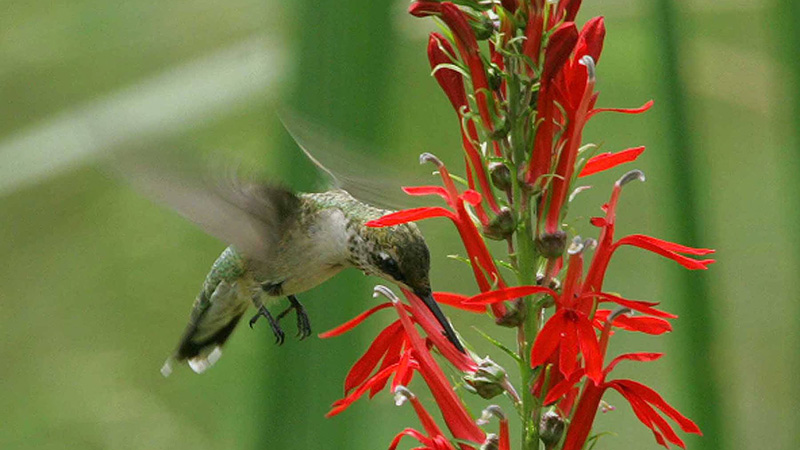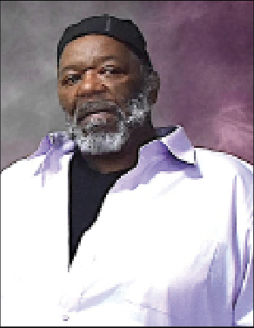How to fill your yard with hummingbirds!
Published 11:29 am Wednesday, July 12, 2017

- Ruby Throated hummingbird. Photo submitted
By Pat Drackett, Director, The Crosby Arboretum, MSU Extension Service
Would you like to know the secrets to filling your yard with hummingbirds? On Saturday, July 22, long-time hummingbird bander James Bell will reveal how you can make your property a magnet to these dazzling birds.
In his program at Crosby Arboretum, James will talk about what is going on in the hummingbird’s life, such as why they fight so much, how they feed, and simple tips and tricks to attract them.
Hummingbirds are amazing! The tiny birds can hover, and even fly upside down to access a flower, and beat their wings about fifty times a second. They fly across the Gulf of Mexico to overwinter in Central America, and migrate through our area in spring and fall.
Did you know you can track the seasonal hummingbird migration? See where the birds are being spotted in the spring and fall migration periods on the Journey North website at http://www.learner.org/jnorth/maps/. You can also report your own sightings.
It is great fun to watch hummingbirds cavorting around feeders, and I’ve known people who will maintain a dozen feeders or more during the migration periods. But if you are new to using the feeders, it’s important to know that the sugar water mixture ferments quickly, producing toxic alcohol. Change the mixture before it becomes cloudy. This can be at least twice a week during hot weather, which causes more rapid fermentation.
You don’t need to purchase special sugar water mixtures. Plain white table sugar is best, at the rate of about a quarter cup of sugar to a cup of water. Raw or organic sugars are not recommended, as they can contain harmful amounts of iron. Don’t use honey to sweeten the water, as it can promote fungal growths. When cleaning, a solution of one part white vinegar to four parts water can be used.
Locate your feeder in a shady place, such as under porch eaves. This will slow the fermentation of the sugar mixture, and prevent the development of molds and fungi. Finally, keep feeders away from areas where cats can hide and prey upon the birds.
Provide plants with the blooms hummingbirds prefer is a great way to attract these beautiful creatures to your garden. We’ve spotted them this year feeding on the Pentas, Salvia, and Coral Honeysuckle in our pollinator garden.
Hummingbirds are attracted to red or orange flowers that are tubular in shape, such as trumpet creeper, red buckeye, coral bean, and cardinal flower. As the tiny birds lap up nectar, pollen is taken up as well, and transferred as they visit the blooms.
But hummingbirds don’t live on nectar alone. They also eat small spiders and insects such as fruit flies and ants for protein. Interestingly, they will feed on tree sap through the holes drilled by other birds such as woodpeckers or sapsuckers.
To read more about hummingbirds and plants to attract them, visit the MSU Extension Service website at http://extension.msstate.edu/. Enter “hummingbirds” in the search field to access many informative articles, including one titled “Attracting Hummingbirds to Mississippi Gardens”. The Extension publication “Establishing a Backyard Wildlife Habitat” contains a list of plants that attract hummingbirds. In the top menu on the Extension website, choose “Publications” and from that page, enter “2402” to access this document, which can be downloaded and saved to your computer.
Finally, take an amazing journey. Find a child, and look up the keywords “hummingbird nest” on your favorite Internet search engine to explore images together of these tiny, delicate creations.
The Arboretum’s Hummingbird program will take place on Saturday, July 22 at 10 AM and is suited to ages 8 and up. Non-member adults, $5, non-members’ children $2. Space is limited, and pre-registration is recommended. Once the class has filled, walk-ins will not be admitted. A second class may be added immediately following the first if there is sufficient interest.
Do you enjoy writing? Plan now to attend “Bringing Nature to Life in Your Writing”, with local writer Mary Beth Magee on Saturday, July 29, from 10 AM to Noon. Non-member adults, $7.
Call 601-799-2311 to sign up for these programs. For more information, see www.crosbyarboretum.msstate.edu





